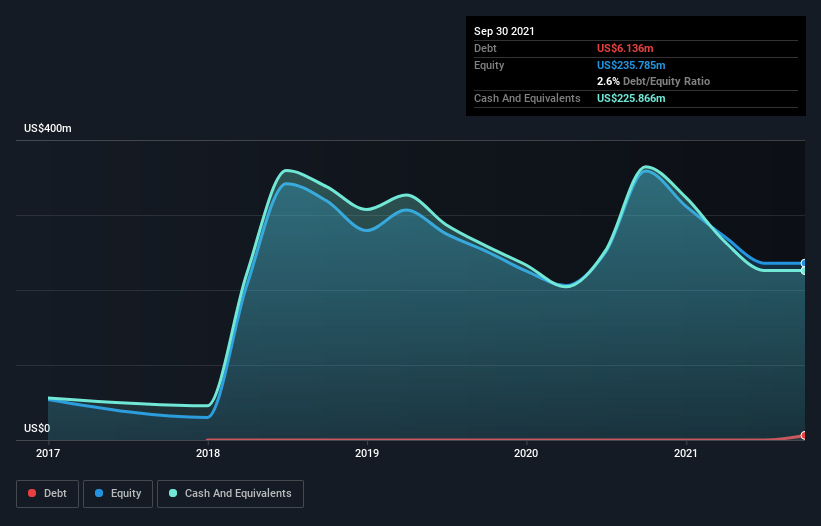
David Iben put it well when he said, 'Volatility is not a risk we care about. What we care about is avoiding the permanent loss of capital.' So it might be obvious that you need to consider debt, when you think about how risky any given stock is, because too much debt can sink a company. We note that Kiniksa Pharmaceuticals, Ltd. (NASDAQ:KNSA) does have debt on its balance sheet. But is this debt a concern to shareholders?
When Is Debt Dangerous?
Debt is a tool to help businesses grow, but if a business is incapable of paying off its lenders, then it exists at their mercy. Ultimately, if the company can't fulfill its legal obligations to repay debt, shareholders could walk away with nothing. While that is not too common, we often do see indebted companies permanently diluting shareholders because lenders force them to raise capital at a distressed price. Of course, debt can be an important tool in businesses, particularly capital heavy businesses. The first thing to do when considering how much debt a business uses is to look at its cash and debt together.
Check out our latest analysis for Kiniksa Pharmaceuticals
What Is Kiniksa Pharmaceuticals's Debt?
The image below, which you can click on for greater detail, shows that at June 2021 Kiniksa Pharmaceuticals had debt of US$6.14m, up from none in one year. But it also has US$225.9m in cash to offset that, meaning it has US$219.7m net cash.

How Strong Is Kiniksa Pharmaceuticals' Balance Sheet?
We can see from the most recent balance sheet that Kiniksa Pharmaceuticals had liabilities of US$38.8m falling due within a year, and liabilities of US$4.64m due beyond that. On the other hand, it had cash of US$225.9m and US$2.55m worth of receivables due within a year. So it actually has US$185.0m more liquid assets than total liabilities.
This excess liquidity suggests that Kiniksa Pharmaceuticals is taking a careful approach to debt. Due to its strong net asset position, it is not likely to face issues with its lenders. Succinctly put, Kiniksa Pharmaceuticals boasts net cash, so it's fair to say it does not have a heavy debt load! When analysing debt levels, the balance sheet is the obvious place to start. But it is future earnings, more than anything, that will determine Kiniksa Pharmaceuticals's ability to maintain a healthy balance sheet going forward. So if you want to see what the professionals think, you might find this free report on analyst profit forecasts to be interesting.
While it hasn't made a profit, at least Kiniksa Pharmaceuticals booked its first revenue as a publicly listed company, in the last twelve months.
So How Risky Is Kiniksa Pharmaceuticals?
Statistically speaking companies that lose money are riskier than those that make money. And the fact is that over the last twelve months Kiniksa Pharmaceuticals lost money at the earnings before interest and tax (EBIT) line. And over the same period it saw negative free cash outflow of US$175m and booked a US$175m accounting loss. But at least it has US$219.7m on the balance sheet to spend on growth, near-term. Overall, its balance sheet doesn't seem overly risky, at the moment, but we're always cautious until we see the positive free cash flow. There's no doubt that we learn most about debt from the balance sheet. But ultimately, every company can contain risks that exist outside of the balance sheet. Case in point: We've spotted 2 warning signs for Kiniksa Pharmaceuticals you should be aware of.
If you're interested in investing in businesses that can grow profits without the burden of debt, then check out this free list of growing businesses that have net cash on the balance sheet.
Valuation is complex, but we're here to simplify it.
Discover if Kiniksa Pharmaceuticals International might be undervalued or overvalued with our detailed analysis, featuring fair value estimates, potential risks, dividends, insider trades, and its financial condition.
Access Free AnalysisThis article by Simply Wall St is general in nature. We provide commentary based on historical data and analyst forecasts only using an unbiased methodology and our articles are not intended to be financial advice. It does not constitute a recommendation to buy or sell any stock, and does not take account of your objectives, or your financial situation. We aim to bring you long-term focused analysis driven by fundamental data. Note that our analysis may not factor in the latest price-sensitive company announcements or qualitative material. Simply Wall St has no position in any stocks mentioned.
Have feedback on this article? Concerned about the content? Get in touch with us directly. Alternatively, email editorial-team (at) simplywallst.com.
About NasdaqGS:KNSA
Kiniksa Pharmaceuticals International
A biopharmaceutical company, developing and commercializing novel therapies for diseases with unmet need and focuses on cardiovascular indications worldwide.
Very undervalued with flawless balance sheet.


